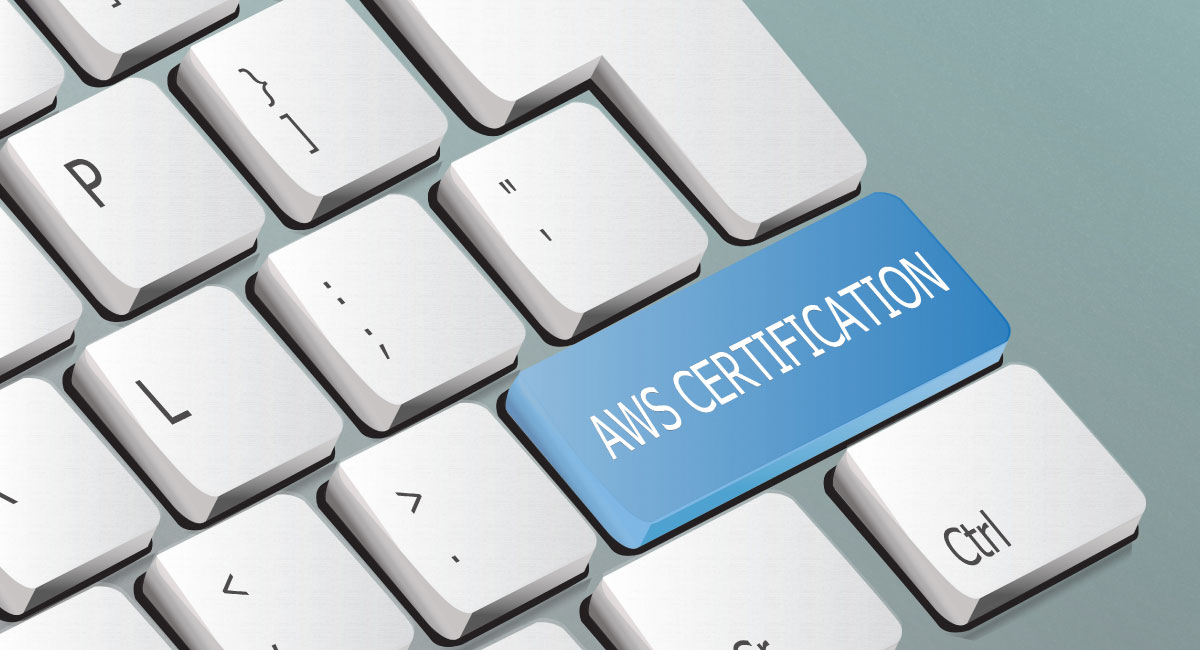AWS, or Amazon Web Services, has been the front runner and one of the early birds in the world of cloud. As a prominent player in the cloud infrastructure market, AWS holds a huge market share.
With businesses being more cloud-dependent than ever, AWS is a great area to specialize in for those wanting to build or advance a career in the cloud. This is where the need to get the right certifications comes in.
In this guide, we will look at some of the best AWS certifications and AWS certification training for you to get started with. The list of certifications we have compiled is helpful for different stages and roles in your cloud career.
What is AWS Certification?
Getting into an AWS job has become a lucrative career path today. But getting there can be a bit tricky. Here is a quick breakdown of everything you need to know about the certification and who can try their hand at it.
First and foremost, the AWS cloud certification is a recognition and validation system offered by Amazon Web Services (AWS). If you are someone to individuals who has an expertise in various aspects of cloud computing. It has become a leading career choice thanks to the expanding cloud market and the credibility of the AWS certification.
AWS Certification is not limited to a specific audience. It caters to a wide range of professionals. If you have your eyes set on cloud-related roles, such as cloud architects, developers, administrators, or solutions architects, you will find AWS cloud certification invaluable. Additionally, these certifications also prove your abilities in the career market.
Also Read: Cloud Engineer Job Description: Here’s Everything You Need to Know
Is an AWS Course Worth It?
As a leader in the cloud domain, AWS is one of the most sought-after companies. Professionals can find a host of compelling reasons to choose an AWS certification.
First, it prepares you for the future job market. According to Amazon, it has a staggering 28 percent projected growth in jobs that demand cloud skills over the next five years. With an AWS Certification, you stay current and learn new skills to stay relevant in the job market.
Second, AWS certification serves as a testament to your skills. A remarkable 91 percent of organizations employing AWS Certified professionals have reported increased innovation with AWS services. This certification is the key to driving innovation within your organization.
Lastly, AWS certification enhances your credibility and productivity. In a survey, 90 percent of IT leaders employing AWS Certified staff showed improved productivity, while 89 percent reported faster troubleshooting. Tackle complex challenges, deliver efficient solutions, and be an asset to your team with this certification.
In short, an AWS cloud certification can be a game-changer for your career. To clarify things, let’s look at how you can navigate this realm.
Top AWS Certification Paths
Luckily, there is more than one way to get certified in AWS. It depends on the specialties you are focusing on. These AWS certification paths are tailored to various roles and specialties within the IT sector. These certifications are your ticket to gaining recognition for your AWS expertise. Here are some of the top AWS cloud certification paths:
AWS offers a comprehensive certification system consisting of 12 distinct certifications. These certifications can be broadly categorized into two main groups:
- Six core certifications
- Six specialty certifications
These certifications address a unique skill set and role within the IT industry.
Core Certifications
- AWS Certified Cloud Practitioner: This foundational AWS cloud practitioner certification is perfect for those looking to grasp the fundamentals of AWS.
- AWS Certified Solutions Architect – Associate: Ideal for individuals focusing on cloud architecture.
- AWS Certified SysOps Administrator – Associate: Tailored for roles that emphasize operations.
- AWS Certified Developer – Associate: Targeted at those in development-oriented roles.
- AWS Certified Solutions Architect – Professional: Designed for experts in cloud architecture.
- AWS Certified DevOps Engineer – Professional: Geared towards DevOps roles.
These core certifications offer a structured progression. You can start with Foundational, advancing to Associate, up to the Professional level.
Specialty Certifications
- AWS Certified Advanced Networking – Specialty: Targeting networking experts.
- AWS Certified Security – Specialty: Focused on validating security expertise.
- AWS Certified Machine Learning – Specialty: Tailored for machine learning enthusiasts.
- AWS Certified Alexa Skill Builder – Specialty: Designed for specialists in building Alexa skills.
- AWS Certified Data Analytics – Specialty: Ideal for data analytics professionals.
- AWS Certified Database – Specialty: Focused on database-related expertise.
Each of these specialty certifications concentrates on specific IT disciplines. These certificates prove that you have a high level of technical proficiency in their respective areas.
As a globally recognized gateway to a fulfilling career, you can count on an AWS certificate to help you navigate a tech career. Getting the certificate requires rigorous training and clearing the examination by AWS. There are notable training providers who provide courses and classes that are self-paced and convenient.
Here’s a list of the best AWS cloud certification programs.
Also Read: What is Cloud Computing? What You Need to Know to Get Started
Best AWS Certification Courses to Learn Amazon Web Services
#1. AWS Solutions Architect
The AWS Solutions Architect course offers a set of resources for those who want to shine in cloud architecture. This program equips you with the skills to design resilient and high-performing architecture on AWS. Here’s a breakdown of the available courses and their descriptions:
- AWS Compute Services Overview: This fundamental course provides insights into different compute options on AWS. It helps learners distinguish between various computing services and select the most suitable one for specific workloads.
- Cloud Quest: Solutions Architect: In this gamified learning path, participants take on the role of a solutions architect. The focus is on scalability, network security, and resource management based on the AWS Well-Architected Framework.
- Solutions Architect Learning Plan: This course deeply delves into AWS architecture best practices. This AWS architect certification includes digital training and AWS Builder Lab activities. It’s an excellent resource for preparing for AWS Certified Solutions Architect exams.
- Introduction to Amazon Simple Storage Service: This fundamental AWS Builder Lab course teaches the basics of Amazon S3. You get to have hands-on experience using the AWS Management Console.
- Amazon Elastic Block Store Primer: This intermediate-level digital course delves into Amazon EBS features, benefits, use cases, and monitoring. It’s free and takes approximately 1.5 hours to complete.
- Deploying your First AWS Lambda Container: This intermediate course guides you through deploying a sample application on AWS Lambda using a container image. It involves AWS Cloud9 and the AWS Serverless Application Model (SAM).
Whether a beginner or an experienced professional, these courses cater to your needs to excel at AWS. Clear the related AWS exam certifications with ease with these courses.
#2. Developers
The AWS Developers course is a comprehensive learning environment. Thrive in the world of cloud development with these courses. Covering a range of topics from fundamentals to advanced techniques, these courses are a must for aspiring AWS developers. Here’s an overview of the available courses:
- Getting Started with .Net on AWS: This fundamental digital course focuses on deploying, managing, and securing .NET applications. This course will teach you how to use AWS services and tools designed specifically for .NET.
- Introduction to Containers: This introductory course is about containerization, explaining its history, concepts, and relevance in microservice architectures. It is suitable for participants with little prior knowledge of containers.
- Cloud Quest: Serverless Developer: In this game-based learning path, participants become AWS Serverless Specialists. This course teaches you how to leverage serverless services to build modern applications. The course covers various aspects of serverless computing, NoSQL databases, secure APIs, messaging, and CI/CD pipelines.
- Event-Driven Architecture with Amazon EventBridge: This is an intermediate AWS Builder Lab. It explores event-driven architecture using Amazon EventBridge. You learn to trigger AWS Lambda functions directly from Amazon API Gateway using HTTP API.
- Front-end is for Everyone: This course guides you in building a serverless, full-stack, single-page app with authentication capabilities. It covers React library features for UI development and integrates AWS services using AWS Amplify.
- How to speed up your AWS Lambda functions: This course is aimed at senior engineers looking to optimize AWS Lambda functions for serverless applications. It covers concurrency, function size, and cold starts, providing insights on achieving optimal performance.
- Developer Learning Plan: This comprehensive learning plan suits developers of all levels. It offers digital training on serverless and container technologies and covers the fundamentals of DevOps on AWS.
If you want to enhance your skills in AWS cloud development, these courses provide a structured and informative path to becoming a proficient AWS Developer.
#3. DevOps Engineer
The AWS DevOps Engineer course can help you launch a successful career in DevOps engineering. It can also enhance your skills in implementing DevOps solutions within the AWS ecosystem. The courses are:
- Getting Started with DevOps: This course caters to beginners interested in understanding DevOps concepts on AWS. It explores the culture, practices, and tools employed in a DevOps environment, emphasizing the development and secure delivery of applications at high velocity on AWS.
- Creating an Amazon Virtual Private Cloud (VPC) with AWS CloudFormation: This AWS Builder Lab demonstrates how to create an Amazon VPC network using AWS CloudFormation. It offers a detailed walkthrough of an AWS CloudFormation template, explaining each step, with ample hands-on experience as well.
- AWS Cloud Development Kit (AWS CDK): This intermediate-level AWS Builder Lab covers the fundamentals. It helps learners understand the AWS CDK and its application in AWS development.
- Create a CI/CD Pipeline to Deploy Your App to AWS Fargate: In this course, experienced DevOps engineers create a CI/CD pipeline for building, testing, and deploying containerized applications to AWS Fargate.
- Advanced Testing Practices Using AWS DevOps Tools: This course demonstrates the integration of testing and security into CI/CD pipelines. It covers advanced testing practices throughout the application lifecycle using AWS DevOps tools like AWS CodeCommit, AWS CodeBuild, AWS CodeDeploy, and AWS CodePipeline.
- Resolve VPC Routing Conflicts: Participants act as network engineers to resolve routing conflicts in a client’s AWS Cloud environment. The lab involves troubleshooting issues in a two-tier web application spanning multiple Amazon Virtual Private Clouds (Amazon VPCs).
- DevOps Learning Plans: These learning plans are designed for DevOps engineers, developers, and operations engineers. If you seek proficiency in deploying secure and reliable applications at high velocity on AWS, then this course is for you. They cover version control, infrastructure as code, and CI/CD concepts.
In your path to becoming a DevOps engineer, these courses provide structured and informative paths to excelling within the AWS ecosystem.
Also Read: How to Become a Cloud Engineer? A Complete Guide
#4. Cloud Operator (SysOps)
The AWS Cloud Operator (SysOps) is designed to help build your skills in systems operations within the AWS environment. Here’s an overview of the available courses:
- AWS Managed Services: Introduction: This course introduces AWS Managed Services (AMS) and its role in managing AWS infrastructure. It explains how AMS takes responsibility for operating supported AWS services, allowing users to focus on applications.
- How AWS Managed Services (AMS) Works Within Cloud Operating Models: In this intermediate-level course, participants delve into cloud operating models and their significance. You can learn more about various cloud operating models, when to use them, and how AMS fits into them.
- AWS Federated Authentication with AD FS: This AWS Builder Lab guides learners through configuring Active Directory Federation Services (AD FS) with AWS Identity and Access Management (IAM), enabling Active Directory users and groups to access the AWS Management Console.
- My Bucket, My Rules: In this course, participants explore Amazon S3 security best practices through practical examples. The lab provides insights into preventive security measures for Amazon S3.
- AWS Systems Manager: Participants are introduced to AWS Systems Manager and engage in real-world scenarios. They learn how the Systems Manager assists in software inventory collection, OS patch application, and automation of administration tasks and complex workflows.
- Cloud Operator Learning Plans: These learning plans are designed for Cloud Administrators, Cloud Operators, and technology professionals looking to automate applications, networks, and systems. The plan covers systems operations knowledge, cloud design, and operational effectiveness.
#5. Decision-Maker
If you are a decision-maker seeking a foundational understanding of cloud technology without delving into intricate technical details, this one is for you.
- AWS Cloud Essentials for Business Leaders: Equip yourself with the core principles of cloud computing. This course elucidates how a well-crafted cloud strategy can align with and bolster a company’s overarching business objectives.
- Machine Learning for Leaders: Tailored for business leaders, this course explores the potential of machine learning in optimizing project outcomes. It also helps in getting invaluable insights into business operations and customer needs.
- Machine Learning for Business Challenges: Gain insights into leveraging machine learning to overcome contemporary business hurdles innovatively. Amazon’s Machine Learning Scientists offer insights into ML terminology, practical business problems, use cases, and real-world examples.
- Decision Maker Learning Plan: Designed to cater to business professionals, this Learning Plan helps you understand the AWS Cloud. Learners are introduced to key AWS Cloud concepts and AWS pricing and support.
Do you want to build your cloud knowledge or align cloud strategies with your business objectives? In that case, Amazon’s selection of digital courses and the Decision Maker Learning Plan is a great option.
#6. Cloud Computing Bootcamp
If you’re a beginner, navigating all the certifications and courses AWS offers can be overwhelming. This online bootcamp can help you build a solid understanding of the AWS ecosystem.
In this program, you’ll learn AWS fundamentals, how to design applications and architectures in AWS, and how DevOps and AWS work together. With 6 months of applied learning, hands-on projects, and a capstone project, you’ll emerge with experience and expertise in cloud computing.
The program is aligned with industry needs and led by experienced instructors. It is suited for cloud professionals and provides a pathway to lucrative career opportunities in the cloud.
Also Read: How to the Pass AWS Solutions Architect Certification Exam?
FAQs
- Which AWS certification course is best?
The best AWS course depends on your goals and expertise. For beginners, “AWS Fundamentals Specialization” on Coursera offers a strong foundation. “AWS Certified Solutions Architect – Associate” is highly regarded by professionals.
- Which AWS course is suitable for beginners?
Our cloud computing bootcamp is excellent for beginners as it provides a comprehensive introduction to AWS core services.
- Is AWS in demand?
AWS is highly in demand, with its cloud services widely adopted by businesses, leading to a continuous need for AWS-certified professionals.
- Can I learn AWS in three months?
Learning AWS in three months is achievable with dedication and the right resources. However, proficiency may vary based on prior knowledge and the depth of your studies. Consider foundational courses for a solid start on your path toward an AWS certification.
You might also like to read:
Cloud Computing Technology: Your Complete Guide
Virtualization in Cloud Computing: Here’s Everything You Need to Know
What Are the Different Types of Cloud Computing? A Comprehensive Guide






